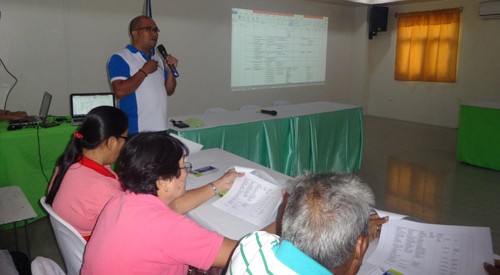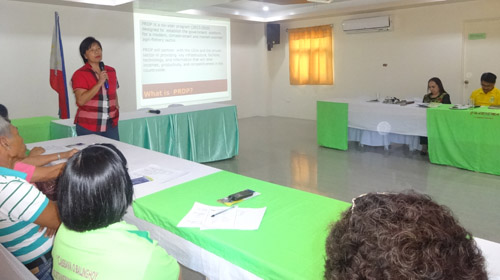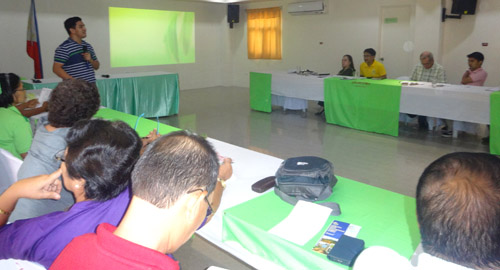 PPMIU-Albay I-PLAN Component Head and Sweet Potato Project Leader Engr. Percival De Villa presents the Value Chain Analysis and draft Provincial Commodity Investment Plan (PCIP) on Sweet Potato of the Province of Albay.
PPMIU-Albay I-PLAN Component Head and Sweet Potato Project Leader Engr. Percival De Villa presents the Value Chain Analysis and draft Provincial Commodity Investment Plan (PCIP) on Sweet Potato of the Province of Albay. Albay collaborates with PRDP, other agencies to take sweet potato industry to the next level
September 29, 2015
For a province known for its best practices in climate change adaptation, having a climate-resilient tuber crop like sweet potato as second priority commodity is complementary.
Data from the Bureau of Agricultural Statistics (BAS) shows that with an average production of 40,167 metric tons, Albay contributes 7.17% annual share to the country’s sweet potato production. In 2009, Albay ranked second in terms of volume of production with 40,167 metric tons. The province has 1,674.90 hectares of effective area for sweet potato production.
Contrary to old misconceptions that it is a “poor man’s food,” sweet potato has now gained popularity among health conscious individuals from all walks of life because of its health benefits. According to Organic Facts, a team of food and nutrition enthusiasts that aim to spread awareness and information about health, organic food, and healthy lifestyle, sweet potato is rich in beta carotene, vitamin B complex, vitamin C, iron, magnesium, and zinc. It has anti-oxidant and anti-inflammatory properties and is effective in relieving asthma and arthritis. It is also an effective facilitator for digestion and is beneficial for curing stomach ulcers as well as cancer of the colon, kidney, intestines and other internal organs. Sweet potato also helps regulate the body’s blood sugar levels and water balance.
Unlike other plants, sweet potatoes are less prone to diseases, are also drought-resistant and grow with minimal use of fertilizer.
With these potentials and health benefits, stakeholders of the sweet potato industry in Albay are convinced that with the Philippine Rural Development Project (PRDP), “to go home and plant camote” would mean to invest in a productive and vibrant industry.
According to PRDP Project Support Office (PSO) South Luzon Planning Specialist Rey B. Lara, sweet potato is a unique commodity because it is not vulnerable to hazard. Nonetheless, farmers must learn to explore other products from sweet potato and take the sweet potato industry to the next level.
“With PRDP, we encourage you to move up to value adding,” he said during the Provincial Commodity Investment Plan (PCIP) Stakeholders’ Consultation on Sweet Potato held on September 22, 2015 at Charisma Hotel in Guinobatan, Albay.
He also enjoined the participation of all agencies to support the value chain of sweet potato in the province.
“Let our PCIP be a working document in charting the development of the sweet potato industry in the province of Albay,” he added.
At the said consultation, stakeholders particularly other government agencies and private entities like the Department of Science and Technology, Department of Trade and Industry, Department of Agrarian Reform, Land Bank of the Philippines and Don Bosco Agro-Mechanical Technology Center among others provided their inputs and recommendations to address issues and concerns that currently beset the sweet potato industry.
These include revitalizing and strengthening existing nurseries, constructing warehouse near island port, providing access or linkage to funding agencies, and intensifying Farmer Business School (FBS) and training on good agricultural practices. Provision of farm, processing, and packaging equipment as well as construction and rehabilitation of farm-to-market roads, ports, and bridges were also proposed. In addition, the stakeholders called for an updated research and development agenda on sweet potato and market study involving new products.
Officer in Charge Provincial Agriculturist Cheryl Rebeta expressed her gratitude to PRDP for assisting the Province in crafting its PCIP for sweet potato.
“This Project will benefit more sweet potato farmers in the province. Farmers are heroes because they work hard to provide food for all of us,” she said.
The PCIP is a three-year strategic plan between the Department of Agriculture and the provincial local government units (PLGUs) based on the value chain analysis of commodities. It is a rolling plan that rationalizes the interventions within the various segments of the commodity value chain and will be the basis in selecting eligible interventions and sub-projects for PRDP funding.
PRDP is a six-year project being implemented by the Department of Agriculture that aims to engage the 80 provinces in the country in establishing an inclusive, market-oriented, and climate-resilient agri-fishery sector. (Annielyn L. Baleza, I-SUPPORT InfoACE Unit, DA-RAFIS 5)
PSO South Luzon I-PLAN Planning Specialist Rey B. Lara encourages the stakeholders to move up to value adding and participate in charting the development of the sweet potato industry in Albay.

RPCO V I-PLAN Planning Specialist Mary Ann R. Cuya discusses the Overview of PRDP during the PCIP Stakeholders’ Consultation on Sweet Potato held on September 22, 2015 at Charisma Hotel in Guinobatan, Albay.

